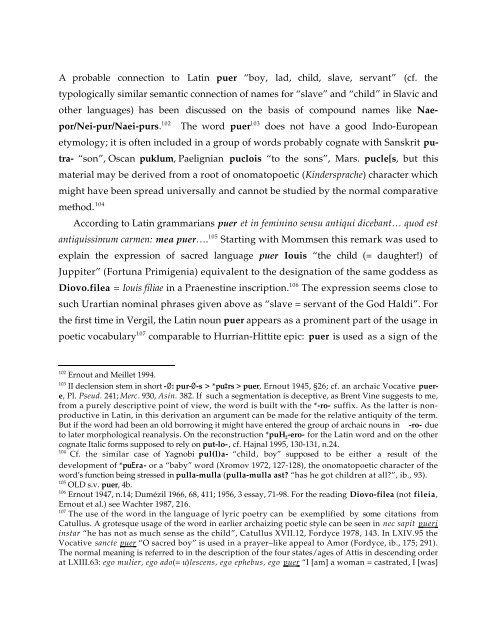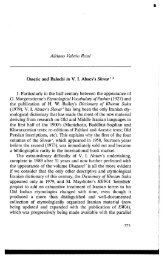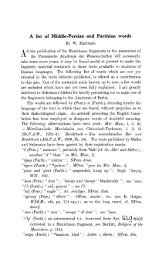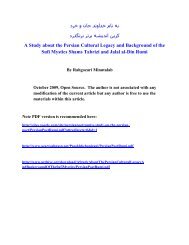Comparative Notes on Hurro-Urartian, Northern Caucasian
Comparative Notes on Hurro-Urartian, Northern Caucasian
Comparative Notes on Hurro-Urartian, Northern Caucasian
You also want an ePaper? Increase the reach of your titles
YUMPU automatically turns print PDFs into web optimized ePapers that Google loves.
A probable c<strong>on</strong>necti<strong>on</strong> to Latin puer “boy, lad, child, slave, servant” (cf. the<br />
typologically similar semantic c<strong>on</strong>necti<strong>on</strong> of names for “slave” and “child” in Slavic and<br />
other languages) has been discussed <strong>on</strong> the basis of compound names like Nae-<br />
por/Nei-pur/Naei-purs. 102 The word puer 103 does not have a good Indo-European<br />
etymology; it is often included in a group of words probably cognate with Sanskrit pu-<br />
tra- “s<strong>on</strong>”, Oscan puklum, Paelignian puclois “to the s<strong>on</strong>s”, Mars. pucle[s, but this<br />
material may be derived from a root of <strong>on</strong>omatopoetic (Kindersprache) character which<br />
might have been spread universally and cannot be studied by the normal comparative<br />
method. 104<br />
According to Latin grammarians puer et in feminino sensu antiqui dicebant… quod est<br />
antiquissimum carmen: mea puer…. 105 Starting with Mommsen this remark was used to<br />
explain the expressi<strong>on</strong> of sacred language puer Iouis “the child (= daughter!) of<br />
Juppiter” (Fortuna Primigenia) equivalent to the designati<strong>on</strong> of the same goddess as<br />
Diovo.filea = Iouis filiae in a Praenestine inscripti<strong>on</strong>. 106 The expressi<strong>on</strong> seems close to<br />
such <strong>Urartian</strong> nominal phrases given above as “slave = servant of the God Haldi”. For<br />
the first time in Vergil, the Latin noun puer appears as a prominent part of the usage in<br />
poetic vocabulary 107 comparable to Hurrian-Hittite epic: puer is used as a sign of the<br />
102 Ernout and Meillet 1994.<br />
103 II declensi<strong>on</strong> stem in short -Ø: pur-Ø-s > *pu‡rs > puer, Ernout 1945, §26; cf. an archaic Vocative puere,<br />
Pl. Pseud. 241; Merc. 930, Asin. 382. If such a segmentati<strong>on</strong> is deceptive, as Brent Vine suggests to me,<br />
from a purely descriptive point of view, the word is built with the *-ro- suffix. As the latter is n<strong>on</strong>productive<br />
in Latin, in this derivati<strong>on</strong> an argument can be made for the relative antiquity of the term.<br />
But if the word had been an old borrowing it might have entered the group of archaic nouns in -ro- due<br />
to later morphological reanalysis. On the rec<strong>on</strong>structi<strong>on</strong> *puH2-ero- for the Latin word and <strong>on</strong> the other<br />
cognate Italic forms supposed to rely <strong>on</strong> put-lo-, cf. Hajnal 1995, 130-131, n.24.<br />
104 Cf. the similar case of Yagnobi pul(l)a- “child, boy” supposed to be either a result of the<br />
development of *puEra- or a “baby” word (Xromov 1972, 127-128), the <strong>on</strong>omatopoetic character of the<br />
word’s functi<strong>on</strong> being stressed in pulla-mulla (pulla-mulla ast? “has he got children at all?”, ib., 93).<br />
105 OLD s.v. puer, 4b.<br />
106 Ernout 1947, n.14; Dumézil 1966, 68, 411; 1956, 3 essay, 71-98. For the reading Diovo-filea (not fileia,<br />
Ernout et al.) see Wachter 1987, 216.<br />
107 The use of the word in the language of lyric poetry can be exemplified by some citati<strong>on</strong>s from<br />
Catullus. A grotesque usage of the word in earlier archaizing poetic style can be seen in nec sapit pueri<br />
instar “he has not as much sense as the child”, Catullus XVII.12, Fordyce 1978, 143. In LXIV.95 the<br />
Vocative sancte puer “O sacred boy” is used in a prayer–like appeal to Amor (Fordyce, ib., 175; 291).<br />
The normal meaning is referred to in the descripti<strong>on</strong> of the four states/ages of Attis in descending order<br />
at LXIII.63: ego mulier, ego ado(= u)lescens, ego ephebus, ego puer “I [am] a woman = castrated, I [was]





